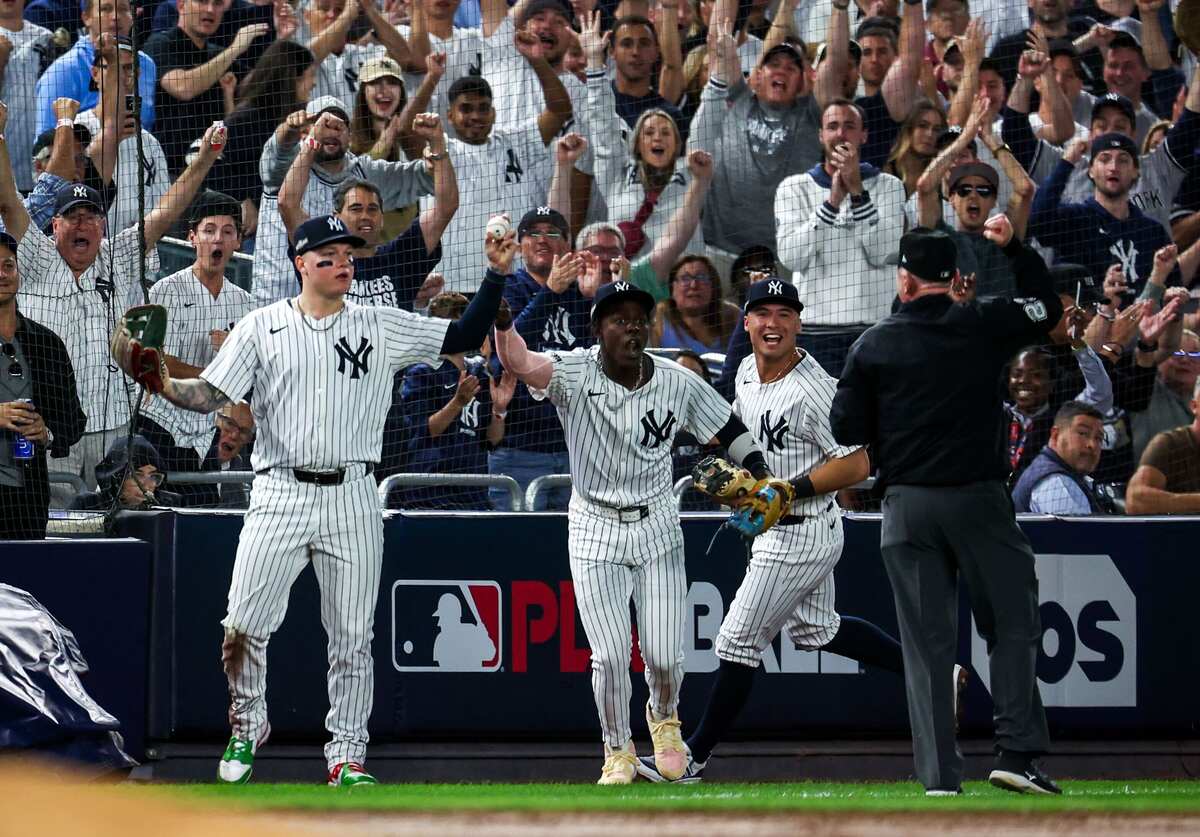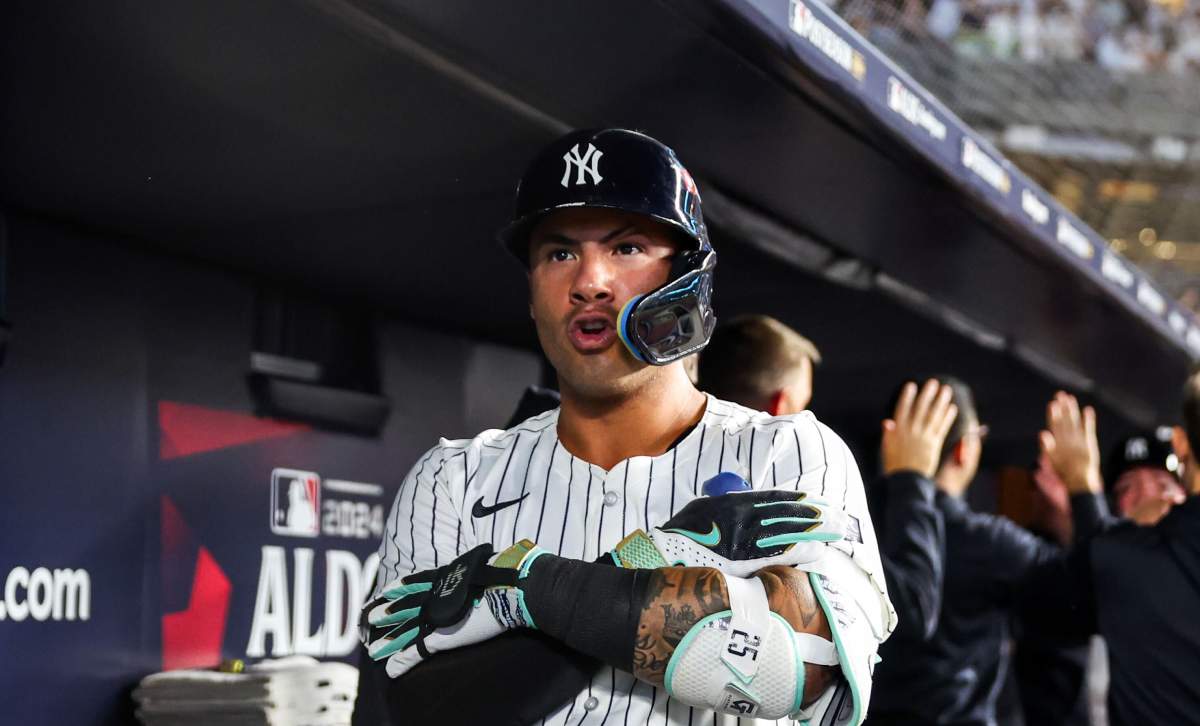Unsung heroes rescue Yankees after top stars falter in ALDS Game 1 vs. Royals


Esteban Quiñones
More Stories By Esteban Quiñones
- Mother’s Day: How Anthony Volpe’s mom molded him into a Yankee phenom
- Aaron Judge on verge of joining elite Yankees club, finds inspiration in Winfield, Jeter, CC
- Steinbrenner ‘got ears’ to hear Yankees’ challenges, yet no gurantee of change
- Michael Kay’s show heading to December ending amid uncertainty over ESPN deal
- Yankees’ Gleyber Torres projected to sign with NL West contender
Table of Contents
The New York Yankees’ first postseason win in 2024 didn’t come courtesy of their marquee players, but instead through the efforts of those who had previously drawn criticism. In a game where Gerrit Cole struggled and Aaron Judge continued his postseason woes, it was manager Aaron Boone’s strategic decisions that took center stage and saved the day.
Though the spotlight usually shines on stars like Cole and Judge, it was the overlooked players who stepped up when the Yankees needed it most, transforming disappointment into triumph in their postseason debut.
Aaron Judge entered the 2024 playoffs looking to improve on a postseason track record that has been a weak point in his stellar career. With a .211 batting average over 44 games and a strikeout in one-third of his plate appearances, Judge had yet to deliver the October dominance expected from the Yankees’ captain. Game 1 of the Division Series presented a chance to rewrite that narrative.
Cole, who allowed three runs in five innings, faced hard-hit balls throughout the game. The Royals tagged him for eight balls hit over 100 mph and 11 above 95 mph—matching a career-high for such hard contact since Statcast began tracking in 2015. Defensive plays by Verdugo, Judge, and Juan Soto kept the damage from getting worse.
Fortunately, Boone made several pivotal calls, opting to start Alex Verdugo in left field over Jasson Dominguez, placing Oswaldo Cabrera at first base instead of Ben Rice, keeping Austin Wells in the cleanup spot, and deploying Clay Holmes in high-leverage moments. Those moves paid off, as Verdugo, Holmes, and Gleyber Torres—each facing scrutiny from fans earlier in the season—played critical roles in the Yankees’ 6-5 win over the Kansas City Royals in Game 1 of the ALDS.
Verdugo, reflecting on his performance, said the postseason offers a chance for redemption — “You can make up for a lot of things in the playoffs” — and it showed as he contributed both at the plate and on the field. His sentiment echoed a broader truth in October baseball: past failures can be quickly forgotten when success comes in the postseason.

Lesser heroes cement Yankees victory over Royals
The game started with a promise for New York. Gleyber Torres drew a walk, and Juan Soto followed with a double down the left-field line, one of his three hits on the night. The Yankee Stadium crowd, 48,790 strong, was electric as Judge stepped to the plate, having already made a spectacular running catch in the first inning to rob Bobby Witt Jr. of extra bases. Witt, the Kansas City Royals star, is considered a close runner-up to Judge for AL MVP honors.
But Judge’s at-bat fell flat. He struck out, missing an early opportunity to put runs on the board. It was a sign of things to come, as Judge went 0-for-4 with three strikeouts. The Yankees, meanwhile, struggled to capitalize with runners in scoring position, managing just two hits in 13 such situations.

Those two crucial hits came from unexpected sources. Austin Wells, mired in a slump late in the season and particularly challenged against left-handed pitching, remained in the cleanup spot behind Judge thanks to a vote of confidence from manager Aaron Boone. After Judge struck out with runners on the corners in the sixth inning, Wells came through with a game-tying single to right off left-hander Sam Long. Earlier in the game, Wells had also drawn a bases-loaded walk.
In the seventh, Jazz Chisholm Jr. singled and stole second base to put himself in scoring position. After two strikeouts, Alex Verdugo, who had shined defensively and offensively all night, delivered a go-ahead single to bring home Chisholm. The run would prove to be the game-winner.
#Yankees win ALDS Game 1 over #Royals #RepBX pic.twitter.com/KdIl0IAOh2
— Pinstripes Nation (@pinstripesnat) October 6, 2024
Verdugo’s performance extended beyond the plate. In the fourth inning, he made a difficult running, sliding catch near the left-field line, preventing a potential extra-base hit and saving runs for Gerrit Cole, who struggled throughout the game. Verdugo’s contributions, both on offense and defense, highlighted how unexpected heroes propelled the Yankees to a 6-5 victory, despite struggles from their top stars like Judge.
Manager Aaron Boone voiced strong confidence in Alex Verdugo‘s capabilities, acknowledging the player’s struggles during the season but emphasizing his versatility and potential. Boone singled out Verdugo’s game-winning hit, praising his ability to go the other way, which proved decisive in the Yankees’ victory.

Clay Holmes, whose season had seen even steeper challenges than Verdugo’s, also stepped up at a critical moment. After losing his role as the Yankees’ closer, Holmes maintained Boone’s trust despite leading the league with 13 blown saves. He was called upon in a tense situation, following dramatic moments that included home runs from Gleyber Torres and Kansas City’s MJ Melendez—both made possible by Yankee Stadium’s short porch—and a costly throwing error by Anthony Volpe that briefly handed the Royals a 5-4 lead.
When Holmes entered the game, the crowd’s reaction was lukewarm, reflecting the frustration from his inconsistent season. Yet, he delivered in the clutch, recording five critical outs to extend his postseason scoreless streak to 9 2/3 innings. His performance kept the game within reach, paving the way for Austin Wells and Verdugo to deliver key hits. Luke Weaver, who had replaced Holmes as closer, then sealed the win.
The Yankees’ playoff opener wasn’t dominated by their marquee names, but rather by the contributions of players who had faced criticism. Boone’s strategic decisions turned potential liabilities into assets, with Verdugo and Holmes leading the charge to victory. The result showcased the unpredictable nature of October baseball, where struggles can turn into redemption stories, and under-the-radar players become pivotal figures in a team’s success.
"The guy's a good hitter."
— YES Network (@YESNetwork) October 6, 2024
– Aaron Boone on what made him choose to start Alex Verdugo in left field pic.twitter.com/FmuIwx3VoF
The Yankees’ lead came under threat in the sixth inning when shortstop Anthony Volpe’s errant throw to second baseman Gleyber Torres led to a costly two-base error. That miscue set up the Royals for a rally, as pinch-hitter Garrett Hampton capitalized with a two-run single off left-handed reliever Tim Hill, giving Kansas City a temporary 5-4 advantage.
The Yankees nearly regained the lead in the bottom of the inning, but Giancarlo Stanton’s lack of speed on the bases proved costly. With two outs and runners on the corners, Stanton grounded a ball to third. Royals third baseman Maikel Garcia made a diving stop and, despite a slow recovery, managed to throw out Stanton at first by a narrow margin, ending the inning and the threat.
Clay Holmes, who had endured a difficult second half of the season, emerged as a crucial asset for New York in the late innings. Called into action in the sixth with a runner on base, Holmes delivered under pressure, getting five vital outs to prevent further damage and stop the Royals’ momentum.
The Yankees’ bullpen was stellar in the final four innings, with a combination of Tim Hill, Holmes, Tommy Kahnle, and Luke Weaver holding Kansas City to just two hits. Their shutdown efforts provided much-needed stability after a rocky outing by starter Gerrit Cole.

Weaver, the last of five pitchers deployed by the Yankees, was particularly impressive, closing out the game with authority. He recorded the final out of the eighth inning and then set down the top of the Royals’ lineup in order in the ninth, securing a four-out save and preserving the Yankees’ victory.
The strong bullpen effort, highlighted by key performances from previously struggling pitchers like Holmes and Weaver, was critical in the Yankees’ win, showcasing the depth and resilience required for success in postseason baseball.
The Yankees’ pivotal seventh-inning rally began with Jazz Chisholm ripping a leadoff single off Royals reliever Michael Lorenzen. Chisholm then swiped second base during Anthony Volpe’s strikeout, prompting a challenge from Kansas City. After a lengthy review, the call on the field was upheld. Following Oswaldo Cabrera’s strikeout, Alex Verdugo, hitting left-handed, connected on an outside cutter, sending a line drive to left field that brought Chisholm home for the go-ahead run.
Earlier, Verdugo had showcased his defensive skills in the sixth inning, limiting Yuli Gurriel to a single after a hard-hit ball off the wall. However, despite Verdugo’s effort, the Royals took a 5-4 lead after a throwing error by Volpe allowed two unearned runs to score.
Verdugo’s standout performance was especially significant given his struggles throughout the season, where he ranked among the least productive hitters in the league. Despite this, manager Aaron Boone maintained confidence in the outfielder, opting to start him in left field for this critical postseason game.
Boone’s trust in Verdugo was rewarded. In addition to his crucial defensive plays, Verdugo reached base three times, including his game-changing single in the seventh inning. His contributions were key to the Yankees’ 6-5 victory over the Royals in Game 1 of the American League Division Series at Yankee Stadium.
Verdugo’s resurgence in the postseason highlights the unpredictable nature of October baseball, where struggling players can step up as heroes and managerial decisions often dictate outcomes. His turnaround not only vindicated Boone’s faith in him but also provided a significant boost to the Yankees’ playoff run.
Despite the victory, the Yankees still face a long road, needing 10 more wins to secure their 28th World Series title. That path will likely require better outings from Cole and Judge, who both struggled in the opener.
What do you think? Leave your comment below.


 Follow Us
Follow Us









